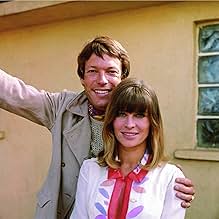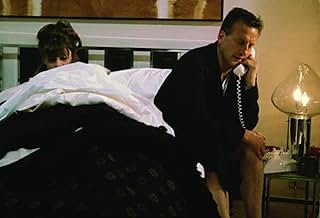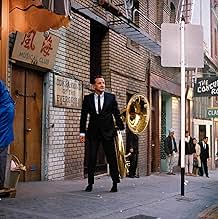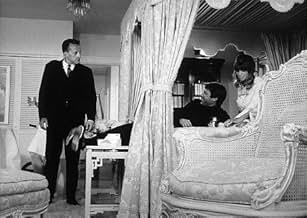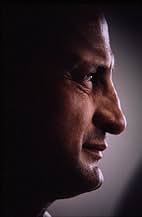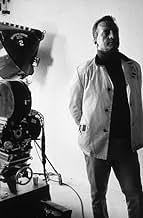IMDb RATING
6.8/10
3.6K
YOUR RATING
An unhappily married socialite finds solace in the company of a recently divorced doctor.An unhappily married socialite finds solace in the company of a recently divorced doctor.An unhappily married socialite finds solace in the company of a recently divorced doctor.
- Director
- Writers
- Stars
- Awards
- 4 nominations total
Nate Esformes
- Mr. Mendoza
- (as Nat Esformes)
- Director
- Writers
- All cast & crew
- Production, box office & more at IMDbPro
Featured reviews
I've never seen a film which captured the confusion of love gone wrong like this. The kaleidoscopic editing can be a distraction but it also helps create the torment of the main character as his life slowly ceases to make sense. Stunningly photographed by Nicolas Roeg, and a clear influence on his later BAD TIMING, in which the neurosis, present in all the characters of PETULIA, blossoms into full-blown psychosis. What this film has over Roeg's is a sharper compassion and a satiric portrait of late summer-of-love San Francisco which feels accurate and quite ahead of its time. Disillusion has already set in. George C Scott is majestic, and Julie Christie goes from irritating in the "BRINGING up BABY for the Pepsi Generation" opening sequences, to ultimately moving and affecting. The ending, where she goes under the gas (to give birth, but it feels more permanent than that), is as oddly chilling as Lester's earlier HOW I WON THE WAR (which ends with Michael Crawford eating a biscuit, and manages to make this terrifying). What can I say? If you have time and sympathy for people who are a bit screwed up, PETULIA may speak to you.
"Petulia" is one of the best American films of all time. It should be ranked with "Citizen Kane" and I'm not being sarcastic.
The beauty of the film is how dated it is. Some films that "define" or capture a certain period of time very well often appear very dated later on and lose their effectiveness because of it. But because "Petulia" is so definately set in it's time period, it's like watching a time capsule. There are films which are made today that take place in the late 60's and try for that "mod" feel. But they're removed from that time and therefore can't capture the true feeling of that tumultuous time. "Petulia" captures it beautifully and integrates the 60's experience into it's storyline and structure. For example, when Archie returns from a day out with his sons and returns to his apartment, on TV there is a newscast about Vietnam. It's not overplayed or anything. It's just there as it would have been on any TV in 1968. It's carefully woven into the structure of the film.
Lester has been praised for his editing in this film and it's pretty ingenious. But overall, I found it at times a little too much. There is a LOT of jumping around in time. We learn the story of Petulia and her abusive husband and the little Mexican boy very slowly over the course of the film. It's only in the final moments of the film where we get the gyst of Petulia's neediness and of Archie's as well. I will never forget the final moment where Petulia softly says Archie's name before being putt under gas to have her baby.
A VERY 60's film. Anyone with an interest in the times and how they might've felt should see this film. One of the most underrated films of all time. Lester shows his true genius here. And like the film, he's the most underrated director. Too bad he's not making films anymore.
The beauty of the film is how dated it is. Some films that "define" or capture a certain period of time very well often appear very dated later on and lose their effectiveness because of it. But because "Petulia" is so definately set in it's time period, it's like watching a time capsule. There are films which are made today that take place in the late 60's and try for that "mod" feel. But they're removed from that time and therefore can't capture the true feeling of that tumultuous time. "Petulia" captures it beautifully and integrates the 60's experience into it's storyline and structure. For example, when Archie returns from a day out with his sons and returns to his apartment, on TV there is a newscast about Vietnam. It's not overplayed or anything. It's just there as it would have been on any TV in 1968. It's carefully woven into the structure of the film.
Lester has been praised for his editing in this film and it's pretty ingenious. But overall, I found it at times a little too much. There is a LOT of jumping around in time. We learn the story of Petulia and her abusive husband and the little Mexican boy very slowly over the course of the film. It's only in the final moments of the film where we get the gyst of Petulia's neediness and of Archie's as well. I will never forget the final moment where Petulia softly says Archie's name before being putt under gas to have her baby.
A VERY 60's film. Anyone with an interest in the times and how they might've felt should see this film. One of the most underrated films of all time. Lester shows his true genius here. And like the film, he's the most underrated director. Too bad he's not making films anymore.
Critically-lauded drama from fashionable filmmaker Richard Lester is certainly handsome enough, although it doesn't initially appear to leave its audience with much but a sour aftertaste. A divorced, frustrated doctor--who has taken up with an exasperating, unhappily married young woman named Petulia--quickly realizes this new direction is adding no particular meaning to his life. Choppy, infuriating picture seems to be leading somewhere but never does; admirers of the film say this is precisely Lester's point, that his tying the story in loose, inconsistent knots is his idea of symbolism. George C. Scott has some amazing moments, Julie Christie is smartly-attired and attractive, Shirley Knight and Richard Chamberlain try hard in underwritten roles, but the movie is pretentiously off-kilter. Lester underlines his scenes with a modern sort of cynicism--American cattiness--that comes off as unfunny and rude rather than satirical. However, the design and conception of the film is startling, and memories of it may sneak up on you days after seeing it. **1/2 from ****
I stumbled across "Petulia" late one night somewhere on cable and quickly became entranced by the mixed up, alarming and sensitive story. Julie Christie and George C. Scott are amazing in this tale of bad marriages and mistakes. Richard Chamberlain, who is chilling to look at no matter what the role, plays the slightly-insane prison-warden husband of Petulia so well it makes your hair stand-on-end with disturbance. Lester's cinematography is amazing - manipulating the scenic San Francisco landscape to its diabolical best - even better than Hitchcock in "Vertigo". It especially captures the essence of the city in its heyday of hippie-drugged-ness, adding another layer to the film's drama. The quick cross-cutting by Lester adds to the disturbing stream-of-consciousness and rich visual chemistry of the film. The 1960's drug culture poignantly juxtaposes the upright middle-class marriages of the main characters, adding color and quirkiness to the already-strange montage. I especially enjoyed George C. Scott in sport coat & tie on the floor of the Fillmore dancing to the Grateful Dead. Petulia is the cross-over character: a free spirit with a tuba in white maribou, being shut up in a stuffy mansion in Marin County, with an abusive, plastic husband. "Petulia" is a wonderful, alarming, disturbing gem of a film that has soaring hope and chilling visuals. Not a film to be missed.
Petulia opens with a shot of a middle-aged woman in a wheelchair, then cuts to a sixties' rock club featuring a very young-looking Janis Joplin. The sixties counterculture definitely torpedoed middle-aged women. Their husbands, like Archie, the middle-aged doctor played by George G. Scott, have the luxury of deciding they're "tired" of being married and jumping into affairs with younger women. This is a cause of continuing sadness to his ex-wife Polo, wonderfully played by Shirley Knight. Archie becomes involved with Petulia (Julie Christie), a clichéd "kooky" young woman of a type that often appeared in films of this period. Petulia is married to an abusive, wealthy husband, David, played with suitable evil by Richard Chamerlain. Christie is such a good actress that she gives some dimension to the role, although she's far outshone by Knight as Polo, the wounded wife. In its technique and attitude it really is a European or British film shot in San Francisco with American actors. There are interesting cultural references to the sixties, that may have seemed daring at the time, but now seem more innocent than anything else. The film is really about Archie and men of his generation and their bewilderment at the changing cultural mores represented by Petulia. On one hand they're delighted to feel that they can have sex with no responsibilities, but Petulia, for all her charm brings nothing but chaos into Archie's life. Was it really worth for him to be involved with her? And he ends up stuck with a high maintenance greenhouse in his apartment.
Did you know
- TriviaAt the opening scene, the singer in the band, Big Brother and the Holding Company, is Janis Joplin, before going on to her solo career. Also in the film is Jerry Garcia of Grateful Dead. The film is set in San Francisco, during the psychedelic rock era, home of these bands.
- GoofsThe instrument referred to repeatedly as a tuba is actually a sousaphone.
- Quotes
Petulia: I'd have turned those beautiful hands into fists.
David Danner: Stop it, Petulia.
Petulia: David, you were the gentlest man I ever knew.
- ConnectionsEdited into The Green Fog (2017)
- SoundtracksMain Title - Petulia
Written and Performed by John Barry And His Orchestra
- How long is Petulia?Powered by Alexa
Details
- Release date
- Countries of origin
- Languages
- Also known as
- Me and the Arch-Kook Petulia
- Filming locations
- Fairmont Hotel - 950 Mason Street, Nob Hill, San Francisco, California, USA(party in the lobby scenes)
- Production companies
- See more company credits at IMDbPro
Box office
- Budget
- $3,500,000 (estimated)
- Runtime
- 1h 45m(105 min)
- Color
Contribute to this page
Suggest an edit or add missing content


